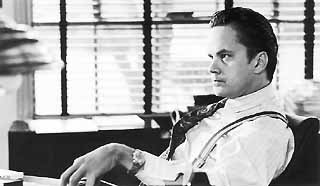https://www.austinchronicle.com/screens/1998-11-13/520616/
Scanlines
Living in Oblivion
November 13, 1998, Screens
with Steve Buscemi, Catherine Keener, Dermot Mulroney, James Le Gros
Swimming With Sharks
D: George Huang (1995)
with Kevin Spacey, Frank Whaley, Michelle Forbes, Benecio del Toro
The Player
D: Robert Altman (1992)
with Tim Robbins, Greta Scacchi, Fred Ward, Whoopi Goldberg, Peter Gallagher, Lyle Lovett, Gina Gershon
|
|
Hollywood, for the most part, has been romanticized as a glamorous business, full of stars and awash in money. Only in the last 10 years, however, have filmmakers looked at the darker side of the entertainment business and told the truth about what they have experienced. Some early films on filmmaking that looked below the surface were small low-budget efforts that usually didn't receive much recognition 'til they were out of circulation. David Holzman's Diary, Jim McBride's fake underground documentary of a film student recording his thoughts and opinions directly to the camera, was one of these, as was Hearts of Darkness: A Filmmaker's Apocalypse, the documentary Eleanor Coppola helped produce after her husband nearly buried his life and career while directing the epic. Some make the argument that the charming musical Singin' in the Rain also embodies a satirical approach to Hollywood, which is true, but it still sugarcoats the nitty-gritty politics involved in the actual making of a movie.
Of late, filmmakers have taken a narrative approach to the industry and shown the real blood 'n' guts of the system. A recent entry into the race is Tom DiCillio's Living in Oblivion. The critically acclaimed independent film about making independent films shows how a simple shot can turn into a hellish endeavor, how actors bitch and moan and how directors deal with stress. Broken into three dream sequences, the movie takes a look at the lives of a director, actors, and the rest of the crew. They trip and bumble through production of the film and somehow come out of it in one piece at the end. Steve Buscemi (who gives his best "guy on the brink of a mental breakdown" performance ever) plays a director full of biting cynicism that he throws out at his crew members with a timed hilarity. The film moves from crew member to crew member, documenting both the ignorance and the frustration of those who work on a film set.
Swimming With Sharks, George Huang's dark comedy about studio executives, takes a look at a different part of the film industry. Frank Whaley (A Midnight Clear, Swing Kids) plays Guy, a wet-behind-the-ears film school graduate who lands a job as a personal assistant to Buddy Ackermann (played with devilish charm by Kevin Spacey), a vice president at the mythical Keystone Pictures. Through esteem-leveling insults and brutal lies, Huang's executives demonstrate the archetypal Hollywood cutthroat attitude, how much punishment the human psyche can take, and how literally killing the ones you love can be your ticket to the top.
The Player, the Robert Altman film that was an instant classic, was based on Michael Tolkin's novel about a murder mystery that takes place among the top studio executives in Hollywood. With enough cameos to make your head spin, The Player centers on the politics of making movies, primarily the people involved in making major decisions. The story revolves around Griffin Mill (played by Tim Robbins), who fears both for the longevity of his job and for his life, due to the flood of threatening postcards he has received from a disgruntled writer. The script is sound, funny, and engrossing throughout, and Altman directs one of his best films ever, most notably with the six-and-a-half-minute shot he uses to open the film (a tribute to Welles' Touch of Evil).
Luckily, most films on filmmaking take a lighter, satirical approach to the industry, which makes them watchable because without a little laughter the stories of the entertainment industry wouldn't be very entertaining. I have found that films that make an audience laugh a little help them to see a basic message a little more clearly. And none of these films fall short of their basic message: The film industry is a mean, heart-wrenching battleground, but because of the dividends it can pay, people will push themselves to greater lengths than they would doing any other job. Call it passion for art, call it greed, call it whatever you want, but that basic message makes Hollywood stand apart. And if, for some reason, you miss the basic message, appreciate these films for the acting, directing and writing, all of which are superb, crafted by those selected few, those who know Hollywood for what it really is. -- Eli Kooris
Copyright © 2024 Austin Chronicle Corporation. All rights reserved.

